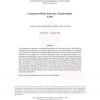Free Online Productivity Tools
i2Speak
i2Symbol
i2OCR
iTex2Img
iWeb2Print
iWeb2Shot
i2Type
iPdf2Split
iPdf2Merge
i2Bopomofo
i2Arabic
i2Style
i2Image
i2PDF
iLatex2Rtf
Sci2ools
115
click to vote
GLOBECOM
2006
IEEE
2006
IEEE
Cooperative Relay Networks Using Fountain Codes
We investigate a cooperative communications scheme with N parallel relays, where both the transmissions from the source to the relays and from the relays to the destination use fountain codes. Receiver for codes can accumulate mutual information, while traditional energy collection methods, such as repetition or cooperative space-time codes, only accumulate energy. As a consequence, using fountain codes can reduce the total energy required for transmitting data from the source to the destination. We first analyze the scenario where the source stops transmitting and the relay nodes start transmitting after L relay nodes have successfully decoded the source data. We optimize L, and also give closed-form equations for the energy savings that can be achieved by the use of mutual-information-collection at the receiver instead of the traditional energy-collection methods. We then analyze an alternate scenario where each relay node starts its transmission to the destination as soon as it ha...
Electric Research Laboratories | GLOBECOM 2006 | Mitsubishi Electric Research | Relay Nodes | Telecommunications |
Related Content
| Added | 11 Jun 2010 |
| Updated | 11 Jun 2010 |
| Type | Conference |
| Year | 2006 |
| Where | GLOBECOM |
| Authors | Andreas F. Molisch, Neelesh B. Mehta, Jonathan S. Yedidia, Jinyun Zhang |
Comments (0)

